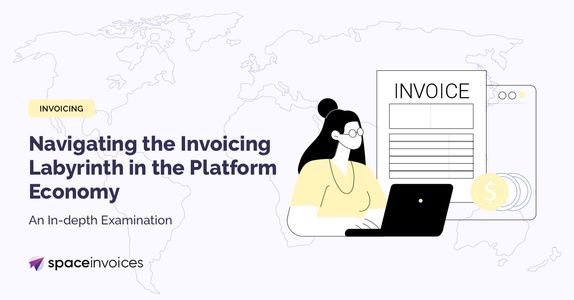Navigating the Invoicing Labyrinth in the Platform Economy: An In-depth Examination
As the platform economy continues to evolve, it presents a unique set of invoicing challenges that stem from its intricate, interconnected, and global nature.
As the platform economy continues to evolve, it presents a unique set of invoicing challenges that stem from its intricate, interconnected, and global nature. Overcoming these challenges is not just about problem-solving; it's an opportunity to unlock new efficiencies, elevate user satisfaction, and drive expansive growth. Let's embark on a deep-dive into these complexities, using real-world examples, to uncover the compelling benefits of tackling these challenges head-on.
1. Mastering Complex Transaction Models
In the platform economy, transactions often involve multiple sellers, buyers, and intermediaries. Imagine an online flea market where a buyer makes a purchase from several vendors in one go. Each vendor needs an invoice for their part of the transaction, transforming a simple process into a complex task fraught with potential errors, disputes, and even revenue leakage.
The Silver Lining: Addressing this complexity head-on can lead to increased operational efficiency, improved accuracy, and higher customer satisfaction. Implementing automated invoicing can drastically minimize errors, ensuring each participant receives accurate and timely invoices. This level of accuracy and transparency fosters trust among platform users, boosting customer retention, and encouraging repeat transactions.
2. Sailing Through Multi-Currency Transactions
In an increasingly globalized platform economy, transacting in multiple currencies is the norm. Picture a platform that connects artisanal craftsmen from Europe with customers across Asia. This platform has to manage transactions in Euros, various Asian currencies, and possibly more, all while keeping up with fluctuating exchange rates. Without a proper system in place, this can lead to pricing inaccuracies and potential revenue loss.
The Silver Lining: Overcoming this challenge equips your platform to cater to a global audience seamlessly. Implementing a dynamic currency conversion system ensures accurate pricing and simplifies transactions for international customers. This not only enhances their shopping experience, building loyalty, but also streamlines financial reporting, offering clear insights into global operations and revenue.
3. Navigating the Global Tax Maze
Operating in multiple countries requires compliance with a plethora of tax laws and regulations. Consider the different VAT rates across Europe, GST in Australia, or sales tax variations in the United States. Non-compliance can result in hefty fines, reputation damage, and user distrust.
The Silver Lining: Successfully steering through the global tax maze allows your platform to operate fearlessly on a global scale. An invoicing system that stays updated with real-time global tax laws ensures compliance and reduces the administrative burden on your team. This safeguards your platform's reputation, strengthens user trust, and allows you to focus on expanding your reach without the constant worry of tax compliance.
4. Streamlining Split Payments and Commissions
Calculating and distributing split payments and commissions is a common challenge in the platform economy. Imagine a home-sharing platform where a guest pays for a stay, the platform takes a commission, and the remaining amount goes to the homeowner. Efficiently managing this process is crucial to avoid disputes and dissatisfaction.
The Silver Lining: By managing split payments and commissions effectively, you can enhance operational efficiency and build trust among users. An automated invoicing and payment solution ensures everyone gets paid accurately and on time, reducing disputes and enhancing user satisfaction. It also provides a layer of transparency, which is key in building trust and loyalty among your platform's users.
5. Crafting a Superior Customer Experience
In the platform economy, a seamless customer experience is a key differentiator. This includes the invoicing process, which should be easy to understand, transparent, and consistent with the platform's branding. A disjointed invoicing experience can confuse users and impact their perception of your platform.
The Silver Lining: By refining the invoicing experience, you're enhancing the overall user experience on your platform. Implementing an invoicing system that synchronizes with your platform's user interface, provides real-time updates on invoice and payment status, and allows for customization to match your platform's branding can significantly boost user satisfaction.
For instance, a music streaming platform that maintains a specific visual theme throughout their platform, including their invoices, ensures consistency and familiarity for the users. This consistency improves user engagement, strengthens your brand's identity, and can lead to increased user retention. Users who feel a sense of control and transparency with their transactions are more likely to trust the platform, leading to repeat transactions and fostering loyalty.
In conclusion, the invoicing complexities in the platform economy are indeed intricate, but successfully overcoming them can unlock a realm of significant benefits. From streamlining operations, enhancing customer satisfaction, ensuring compliance, to driving growth, the potential is vast. By investing in a robust, automated, and user-friendly invoicing system, you can turn these challenges into stepping stones for your platform's success.
At Space Invoices, we understand the invoicing challenges faced by platforms in today's dynamic economic landscape. That's why we've designed an API-first invoicing solution specifically tailored to meet these unique needs.
Additional reading:
Start issuing Invoices, free!
Signup and start issuing compliant invoices from your software in minutes.
Or contact us to get a free implementation consultation.
